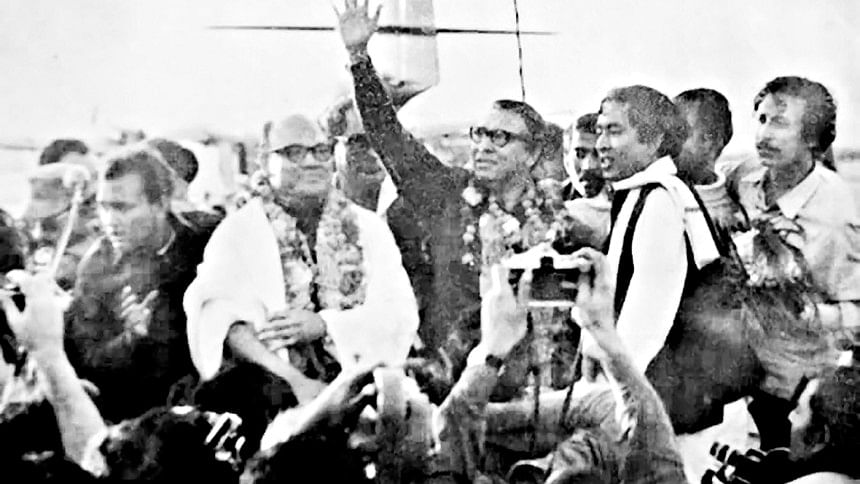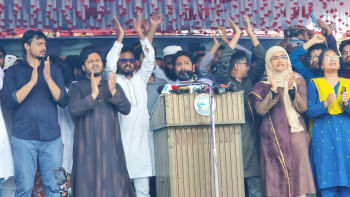An unsung hero: Tajuddin Ahmad and the Bangladesh revolution

The period between 1945 and 1979 was one of Cold War and decolonisation. The Cold War entered a different trajectory with the rapprochement between China and the US and the Iranian Revolution. Those who became active in politics in this era were swayed by the dynamics of the Cold War, its ideological fallout, and a quest for national emancipation. Tajuddin Ahmad, who was born on 23 July 1925, belonged to the era of the Cold War, ideological competition between socialism and capitalism, and emancipation from imperial domination. Tajuddin Ahmad was a young student activist in the Pakistan movement. A perceptive student, he identified it as critically related to the settlement of the national question on the subcontinent alongside the emancipation from colonial control. On 14 August, he was elated when Pakistan was proclaimed a sovereign republic. In his diary, he sang praises for the coming of Pakistan.
Yet did Pakistan become a land of eternal Eid? Did it provide food to the multitude of toiling masses in East Pakistan? Did peasants gain their freedom from the domination of landlords and parasitic classes? He was dismayed by the absence of democracy, the obstinacy of the Muslim League with a particular version of development, and the increasing absence of democracy. He toyed with the idea of a social-political formation and briefly associated with the Gana Azadi League, an ephemeral political organisation that came into existence at the moment of political exuberance in 1947. Like many others, he veered towards the People's Muslim League, or Awami Muslim League, when it was born in the Rose Garden of Dhaka in 1949. He was not an ebullient, flamboyant political personality. He was rather a quiet, self-introspective person dedicated to achieving the goal.
The global 1950s and 1960s were moments of political rebellion, and the Cold War was raging supreme. In the Muslim world, there emerged new political heroes like Abdel Gamal Nasser, Sukarno, and Ahmed Ben Bella. The Algerian revolution, emancipation in Congo, the Bandung Conference, the Cuban Revolution, and later on the war in Vietnam and the Cultural Revolution in China inspired many. Students, youths, and emerging politicians in East Pakistan noticed with alarm the gradual slide of Pakistan towards a military-bureaucratic axis—a growth of praetorian capitalism that initiated a process of internal colonisation of East Pakistan, and global alignment with the United States, at a time when the entire Muslim world in the Middle East, and Asia, Africa, and Latin America in general, was moving ahead with national emancipation struggles. Tajuddin remained active in the movement for the restoration of democracy, developed sympathies for the underground Communist Party and the Soviet Union, and remained engaged in the newly resurrected Awami League under Sheikh Mujibur Rahman.
Pakistan was experiencing a democratic political convulsion in the late 1960s. As student revolutions broke out in Paris and Mexico City, could Lahore, Karachi, and Dhaka be left behind? Though imprisoned for his participation in the autonomy movement in East Pakistan, Tajuddin remained the quiet organisational man in the Awami League. At the time, the Awami League was the national platform for the autonomy movement. He was with Sheikh Mujib and prepared the ground for the electoral victory of the autonomy movement in East Pakistan.
In 1971, he was one of the key architects of the negotiations with the military regime for the transfer of power to the elected majority party in the constituent assembly. But on 25 March, Operation Searchlight unleashed a campaign of genocide in East Pakistan. At this critical moment, Sheikh Mujib could offer no guidance. He chose arrest, hoping that autonomy could still be achieved through non-violent means. Tajuddin, however, recognised that the path ahead was no longer political negotiation—it was a war of liberation.
Tajuddin soon moved to India along with Amirul Islam. It was through his political sagacity that Bangladesh witnessed the birth of a government-in-exile, which took oath in Baidyanath Tola, in a historic mango grove—reminding Bengalis of the lost independence of 23 June 1757. He was opposed by radical students loyal to Mujib, particularly Sheikh Moni. The factional squabble reached its crescendo when an assassin attempted to take the life of Tajuddin in Calcutta. Khondoker Mushtaq, a veteran Awami Leaguer, conspired to compromise the liberation struggle and established contact with the US Consulate in Calcutta.
Tajuddin steered the leaky boat of the Mujibnagar government to the safe harbour of independence amid genocide, conspiracies, a refugee exodus, and an international alliance between Pakistan, China, and the United States of America.
Along with his colleague Syed Nazrul Islam, he guided the liberation struggle, coordinated the movements of Mukti Bahini field commanders, and negotiated with the Government of India—an alarmed partner with its own national interest. On 16 December 1971, he could claim that under his stewardship, Bangladesh had achieved independence.
Yet after independence, it was not smooth sailing. The country was in chaos, the economy was in ruins, and infrastructure was devastated. He took time to return to Dhaka, coming back a week later. His command was weak. Sheikh Moni and Sirajul Alam Khan refused to recognise his authority. More importantly, when Sheikh Mujib returned on 10 January 1972, he was informed against Tajuddin. Sheikh Mujib, the towering figure of Bangladesh's politics, grew distant from Tajuddin. He was also apprehensive about his absence during the most pivotal moment in the country's birth.
The attempt to build a state-guided economy was a disaster. A famine stalked the countryside. The new quasi-Marxist nationalist revolutionary party JASAD was moving against Sheikh Mujib. Tajuddin was clearly uncomfortable in such a situation. He was isolated within the Awami League, yet he was reluctant to revolt against Sheikh Mujib. He finally resigned from the Bangladesh ministry in 1974, when famine was about to rage across the country.
Tajuddin, a socialist by conviction, was aghast when a petty bourgeois party like the Awami League pretended to be a revolutionary outfit and proclaimed a one-party dictatorship. He grew distant from Sheikh Mujib but warned him of an impending coup.
When a revolution collapses, its leaders often fall with it. In the aftermath of a bloody coup, Tajuddin could not bring himself to align with Khondoker Mushtaq. At that moment, his fate was sealed. He was arrested, cast into prison, and brutally assassinated on 3 November—in the very country he had helped steer towards independence. It was a time of profound confusion, as successive coups and counter-coups eroded the fragile foundations of Bangladesh's government. The forces of revolution and counter-revolution came to define the lives of those who had once dared to dream of emancipation.
Tajuddin joined the ranks of Nkrumah, overthrown from power; Patrice Lumumba, brutally assassinated; Ben Bella, ousted in a coup; and Sukarno, cast into imprisonment. Yet could the forces of counter-revolution erase his name from history? It is precisely there that he lays claim to the glory of immortality.
Subho Basu is an Associate Professor at the Department of History and Classical Studies at McGill University.

 For all latest news, follow The Daily Star's Google News channel.
For all latest news, follow The Daily Star's Google News channel. 



Comments